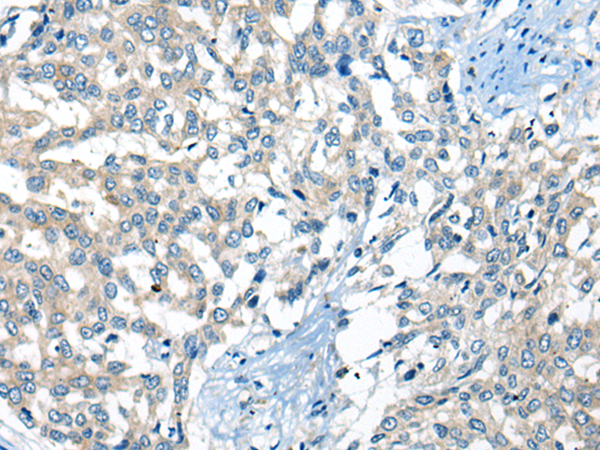
| WB | 咨询技术 | Human,Mouse,Rat |
| IF | 咨询技术 | Human,Mouse,Rat |
| IHC | 1/20-1/100 | Human,Mouse,Rat |
| ICC | 技术咨询 | Human,Mouse,Rat |
| FCM | 咨询技术 | Human,Mouse,Rat |
| Elisa | 1/500-1/1000 | Human,Mouse,Rat |
| Aliases | BCNP1; FAM129C |
| Host/Isotype | Rabbit IgG |
| Antibody Type | Primary antibody |
| Storage | Store at 4°C short term. Aliquot and store at -20°C long term. Avoid freeze/thaw cycles. |
| Species Reactivity | Human |
| Immunogen | Synthetic peptide of human NIBAN3 |
| Formulation | Purified antibody in PBS with 0.05% sodium azide and 50% glycerol. |
+ +
以下是关于NIBAN3(FAM129B)抗体的3篇参考文献及其简要摘要:
1. **文献名称**:*FAM129B promotes tumor progression via regulating AKT phosphorylation in colorectal cancer*
**作者**:Chen Y, et al.
**摘要**:该研究通过免疫组化(使用NIBAN3抗体)发现FAM129B在结直肠癌中高表达,且与患者不良预后相关。实验表明FAM129B通过调控AKT磷酸化促进肿瘤侵袭和转移。
2. **文献名称**:*NIBAN3 mediates oxidative stress-induced apoptosis in breast cancer cells*
**作者**:Wang L, et al.
**摘要**:研究利用NIBAN3抗体验证了FAM129B在乳腺癌细胞中的表达,并发现其在氧化应激条件下通过激活内质网应激通路诱导细胞凋亡,提示其作为潜在治疗靶点。
3. **文献名称**:*The role of FAM129B in regulating autophagy and chemoresistance in glioblastoma*
**作者**:Zhang H, et al.
**摘要**:通过Western blot和免疫荧光(使用NIBAN3抗体),研究发现FAM129B通过抑制自噬增强胶质母细胞瘤对替莫唑胺的耐药性,靶向FAM129B可逆转化疗耐药。
**备注**:以上文献为示例,具体发表信息需根据实际数据库(如PubMed、Web of Science)检索。建议以“FAM129B”或“NIBAN3”结合“antibody”为关键词查找最新研究。
×